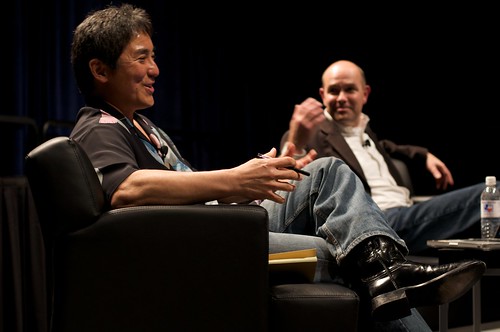SXSWi 2009: Tuesday Keynote: Chris Anderson / Guy Kawasaki Conversation
Last March I went to SXSWi 2009. I posted the notes from two of the days, but conference exhaustion got in the way of me posting the notes from the last three days. After much delay, here they are.
Tuesday Keynote: Chris Anderson / Guy Kawasaki Conversation
Room A
Tuesday, March 17th
2:00 pm – 3:00 pm
In 2006, Chris Anderson introduced the concept of the Long Tail. His soon-to-be released book will talk about the power of free. Will his theories stand up to the tough questions of venture Silicon Valley venture capitalist Guy Kawasaki?
Chris Anderson: Wired Magazine
Guy Kawasaki: CEO, Alltop
Chris Anderson:
Who is going to pay?
OMG, Chris doesn’t speak well… What is he talking about?
For Twitter, charge companies. Free product vs. premium product You don’t want to cripple the free and you don’t want to set the premium so high that no one upgrade. How do you create the version of the product that doesn’t cripple the free product.
Once you install a price, you quickly find out what people like you.
Paper still matters. Which paper adds values to the Internet. Books matter.
Will my book be free? Some forms of the book will be free.
Guy Kawasaki:
Which is harder? Achieving popularity or monetization of popularity?
Chris Anderson:
Monetization. Each one of us have to convert our own way to find a way to earn money.
The key problem is misaligned interests.
Guy Kawasaki:
My test for spam. If I do it, it’s clever marketing. If someone else does it, they’re spam.No one can call me hippocritical.
James Hida changed the music business. He worked at Apple and negotiated with the music industry to sell songs for 99 cents.
Chris Anderson:
The word free is one of the most misunderstood word. We’re drawn to it, but we’re afraid of it.
20th century free: marketing trick Give away the book and charge for the dust jacket.
21th century free: economy of bits, where everything gets cheaper over time. You can take the quotation marks off the word free.
Media Business Model: The extension of the media model FAR more than what was useful.
Freemium Model: You give away 99% of your product to sell 1% of it. If you can convert of your users to paid, then you can cover your costs.
37 Signals makes it important to pay since the beginning.
Bertrand Russell’s Law of Competetive Cost: Piracy is the animal of competition. If you stop charging, you take away motivation for the pirates.
Free creates fame and you have to learn how to monetize from the fame.
Guy Kawasaki:
Let’s try an analog example. Starbucks: regular coffee is free. Would it work? You have to calibrate it.
Chris Anderson:
Walls Drug Free Water Yes, it does work?
Tony from Zappos gives away free shipping.
Every company uses free in some form or another.
Guy Kawasaki:
one penny vs. free is a massive gap
Chris Anderson:
We have to value is something is worth it. Free never raises the flag. This is the curse of micropayments. It’s not about the money. It’s about the flag.
Free is powerful and one penny is powerful.
In the physical world, you need to cause people think hard about waste.
In the digital world, waste is non existant. It should be free.
We understand that there is no excuse for sucking online. If they suck, we’ll deprive them of our attention.
We are more motivated by negative than positive. Lost vs never gained. Traditional marketing is about convincing your buyer that it’s great. Free says, you can have it try it out.
How people look at free, is weighted from their expectations.
This is a great time to start a company. You can produce, even if you don’t have access to a printing press.
Currencies fall. It can all vaporize. You’ll still have a family. You’ll still have a roof over your head.
Question: Freetard Environment Are you helpful to our industry?
The difference what I do vs economists do is that I never prescribe. I describe what is happening. I don’t make the apple fall. Gravity makes the apple fall.
Question: How does this apply to the luxury market?
Some information wants to be free. Some information wants to be very expensive.
Free is there in the marketplace. The mass popularity of knock-offs drive demand for the luxury designs.
It’s all based on expectations. There is nothing wrong with charging for your products.
Microsoft has been competing with free for real. How do they compete? They aren’t selling software. They are selling competence and risk reduction.
There’s free as in speech and free as in beer. There’s also free as in kittens.

